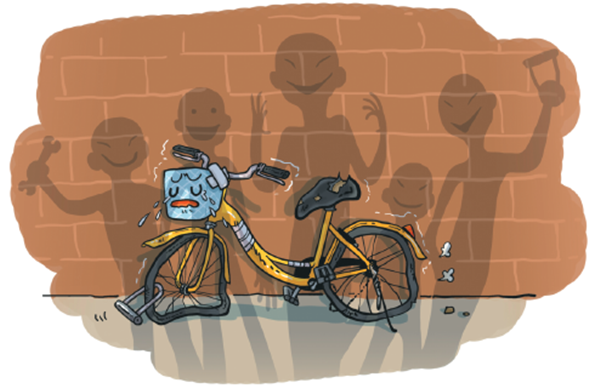 |
|
LIANG LUWEN/CHINA DAILY |
I almost came to grief the other day in a small park not far from where I live when a boy trying to ride one of those yellow rental bikes you see all around Beijing lost balance and crashed to the ground just in front of me.
"Come on, son, try again," a middle-aged man told the boy, who was, I suppose, about 10.
"The handle's twisted," the boy replied.
"No worries. Let's find another one," the man replied, leaving the bike lying in a flower bed and walking off with the boy.
Within a few minutes there the boy was again, astride another shiny new yellow bike, practicing his riding skills.
"There are just no standards any more," my friend said. "Essentially his father just told him that it's OK to go around wrecking things."
All I could do was sigh in agreement.
Over the past couple of years many big Chinese cities have lived through what can only be described as some dire days when it comes to air pollution. However, against that, some very positive things have happened on the environmental front. One of them is the proliferation of bicycle-sharing services, something that can contribute, even if in only a small way, to taking cars off our roads.
Beyond environmental considerations, it is the ease of access to the service that attracts commuters. To use the orange bicycles of the company Mobike you download an app and pay a deposit of 300 yuan ($45). It costs 0.5 yuan for half an hour. There are no fixed pick-up or drop-off points for the bikes, which can be located with the help of GPS signals and then unlocked by scanning a QR code.
Convenience
By the end of last year there were 18.86 million bike-sharing app users in China, says BigData research. Bike sharing service has delivered them convenience and given all of us a little environmental respite but, as with many innovations, there have been nefarious side effects as well.
Reports of all kinds of bad behavior abound, of which the following is but a small catalogue:
Case 1: Theft. Some thieves have even gone on to brazenly rent out the bikes they have stolen. Beijing Television told of a man who was found in possession of a bicycle belonging to the company Ofo. Ofo's signature yellow paint had disappeared under a coat of black paint and a baby seat had been attached to the bike. The man was said to have a monthly income of more than 10,000 yuan, well above the average salary in Beijing.
Case 2: Some people commandeer the bikes, clamping locks on them so that no one else can use them.
Case 3: Users lazily deposit bikes anywhere they like, without thinking about any inconvenience to others.
Case 4: A huge number of bikes simply disappear or are badly damaged somewhere along the line. In Putian, Fujian province, of 667 bikes that one company deposited in the city before the Spring Festival, 550 went missing. Damaged bikes have been found in various places.
Case 5: Some bikes are misused by children, such as for racing. Some children have been seen racing rental bikes on streets. In China children under the age of 12 are barred from riding bikes and tricycles on roads. Last month the Shanghai government called on Mobike, Ofo and the other big bike-sharing app operator, Bluegogo, to make their bicycles less accessible to children.
Case 6: The bikes are targeted by fraudsters. In Nanjing, Jiangsu province, and other places fraudsters have glued payment codes to the rental bikes that when scanned transfer money to the crooks.
This catalogue of woes spoils what ought to be a good news story in which someone comes up with a commercial idea that benefits the innovator, consumers and the world at large.
Positive things
So why do these very positive things always have to be tarnished by what is after all probably a small minority - even if the tale of the missing 550 bikes in Fujian strongly points in the opposite direction? Some reckon it comes down to the fact that many people simply lack a moral compass, not knowing the difference between right and wrong. I maintain that badness is innate to all of us, and that it is useless to call on those who lack moral values to practice self discipline. We all need regulations, admonition and the threat of punishment to keep us in line.
The man in Beijing who took the bike, repainted it and attached the baby seat was held in detention for two weeks. Two nurses caught outside the Beijing hospital where they worked unlocking rental bikes they had locked were detained for five days. They are said to have claimed that they were unaware that what they did was wrong and said they were sorry.
In the economic theory called the tragedy of the commons formulated about 180 years ago, William Forster Lloyd explained how the actions of users in a shared-resource system pursuing their own interests could spell disaster for the group, and he cited the example of a group of farmers grazing cows in a paddock, leading to overgrazing.
In modern day China the terrific bicycle sharing system that has sprung up over the past eight months is akin to grass. My fear is that because of the greed and thoughtlessness of a few, before long that grass will be dead.
linjinghua@chinadaily.com.cn
|
|
|
|
|
|
|
|
